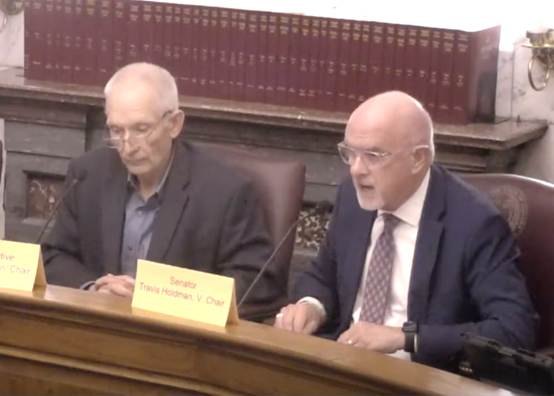By MARK MILLER
The State and Local Tax Review task force wrapped up its two-year effort Wednesday afternoon, adopting nine recommendations to forward the Indiana Legislature.

The task force was formed in 2023, established by Senate Enrolled Act 3-2023 authored by Sen. Travis Holdman of Markle. He co-chaired the task force along with fellow Republican Rep. Jeffery Thompson. It was comprised of four members from each branch of the legislature and four other staff members of the the state government. The group met four times in 2023 and another four times this year, during which they heard from 55 witnesses.
While the initial impetus for forming the task force was centered on studying the feasibility of eliminating the state’s income tax, the group’s studies became a more wholistic overview of Indiana’s tax system and then eventually almost totally focused on property taxes.
Holdman provided an overview of the task force’s efforts and details on the complexity of property taxes the during the group’s final meeting Wednesday afternoon.
“While it has been demonstrated that Indiana has a competitive and taxpayer friendly system,” Holdman opened his remarks, “help for the taxpayer is on the way. However, it may take some time to work its way through the established system as well as the General Assembly.”
In their formal final report, the task force made six recommendations regarding property taxes and three recommendations regarding local income taxes:
Property Taxes:
• Enact more effective controls on property tax bills.
• All eligible over 65 property taxpayers should receive a credit to ensure a reduction on their property tax bill.
• Refine the agricultural land base rate methodology.
• Increase the de minimis business personal property tax exemption to help small Hoosier businesses.
• Reduce the 30% floor for all business personal property to spur economic development.
• Make progress towards a transparent and accountable property tax system that enables taxpayers to see a reduction in their property tax bill when their local unit reduces its tax rate, particularly homeowners.
Local Income Taxes:
• Enable the collection and distribution of LIT revenue within a county by utilizing Geographic Information Systems.
• Phase in a reduction to the overall LIT rate cap to match the state income tax rate.
• Permit larger municipalities to adopt their own LIT rate under the overall LIT rate cap.
After Holdman’s presentation, there was considerable discussion for the remainder of the approximately 40-minute meeting. There were repeated concerns expressed about the impact of rising property taxes on senior citizens. Rep. Edward DeLaney, (D-Indianapolis), told the group he could not support the final product however, stating he does not feel the recommendations adequately address the “tax shift” that has “increased the reliance on homeowners while decreasing the reliance on businesses” and other categories, he told the group.
He cited statistics that average property tax bills have increased 92% since 2011.
Sen. Fady Qaddoura (D-Indianapolis) suggested the words “particularly homeowners” be added to the wording of the recommendatations, which was adopted by consensus of the task force.
DeLaney appreciated the inclusion, but replied that the “tax caps have become a failed government promise” in that they are more protective of wealthier homes than lower-priced homes.
Rep. Greg Porter (D-Indianapolis) was not able to attend but submitted other concerns, notably his opposition “to any further relief for businesses.”
With two members unable to attend, when Rep. Thompson called the roll call of the 12 members, the proposals passed by a 9-1 vote with the sole “nay” coming from DeLaney.
Holdman shared with the group that there are several senators working on legislation to address some of these issues in the coming session.
miller@news-banner.com



